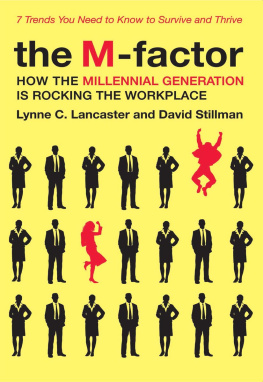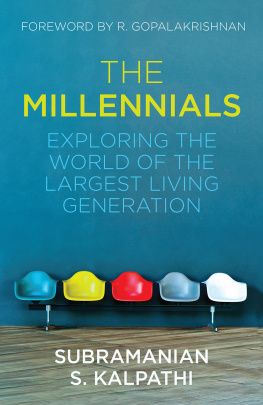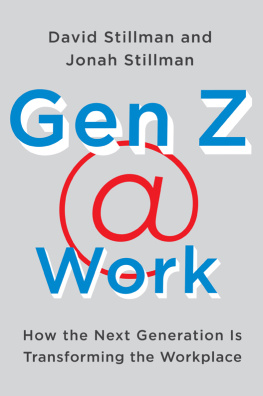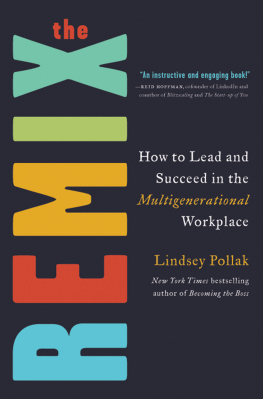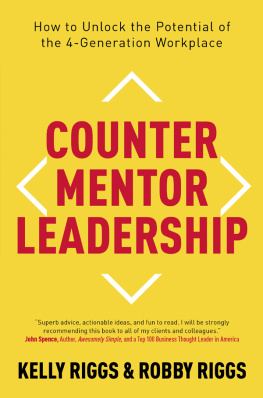I have a wireless router in my trunk. Why dont I go get it? the fresh-faced intern asked helpfully.
David yanked his head out from under the desk. He had been fiddling with his Internet connection for forty-five minutes while the new summer intern watched politely. Never mind that David had a crick in his neck, a pain in his knee, and had knocked his head on the keyboard tray. Now he didnt even know how to respond.
Would that help us? he asked plaintively, blinking dust out of his eyes.
The intern pondered her answer. She did not want to offend her new boss, a Gen Xer who obviously took pride in his technical know-how. On the other hand, if she let him continue grappling lamely with all those wires this could take forever, and she really wanted to make progress on her first day.
She spoke loudly and slowly as if English was Davids second language: Well, if I go get it we dont have to waste time trying to hard-wire everything and both computers can just log onto the network through my router.
David stared at her feeling English was his second language. He brushed himself off and there was an uncomfortable silence.
She jumped in supportively: Dont worry; I dont need it back right now. I have, you know, another one at home.
She gave David an encouraging nod and bounded out of his office. As soon as the intern had disappeared, Baby Boomer Lynne poked her head into Davids office grinning happily. After years of feeling like a dinosaur while David tormented her with the latest and greatest technologies, it was finally Lynnes turn to watch David squirm. Her enjoyment was all too brief; the intern was back in a flash. Before either boss could say a word, she dove under the desk, reconfigured the system, leaped back up, and was eagerly awaiting her next assignment. It was 8:45 a.m.
Her name was Debra. And while interns were not exactly new to BridgeWorks, this one seemed alien. What was different? She was a Millennialour first one.
How a Whole New Generation Is Colliding, Clashing, and Clicking with Traditionalists, Boomers, and Generation Xers
It was a landmark day at BridgeWorks as we welcomed a new generation to the team. We could only speculate if a company specializing in generational differences could be caught off guard by a single Millennial, what was happening in the rest of the business world?
We see them on the street, in the malls, in school, in our living rooms, and at times in our faces. We watch as they text message, surf the Internet, microwave a snack, listen to iTunes, and download a favorite TV show all at the same time. We wonder if the Millennials can truly do it all and if theyll actually do it a little better than we did. Amidst our musing, it seldom occurs to us that the same people who glared at us across the dinner table will soon be staring at us across the conference table.
The leading edge of the Millennial generation, born between 1982 and 2000, began showing up in part-time jobs in the late nineties, and not only has it made its presence known, this generation will continue being a force to reckon with over the next decade and beyond. As Millennials join Generation Xers (born 196581), Baby Boomers (born 194664), and Traditionalists (born prior to 1946), the question becomes, will corporate America make the same mistake it made when Generation X showed up on the job?
In the late 1980s and early nineties, when Gen X entered the workforce, companies were blindsided. Employers never expected Xers to behave differently from Baby Boomers or that they would have their own unique expectations about the workplace. From dress codes to rewards programs, Xers railed against doing things the way they had always been done, and companies struggled to adapt. Years later many companies are still trying to figure out Generation X.
Flash forward and its dj vu all over again as the Millennials make their debut. A whole new generation has arrived in the workplace and surprise, surprisethe way its always been done is getting ready for more renovation.
The Millennialssometimes called Generation Y, GenNext, the Google Generation, the Echo Boom, or even the Tech Generationare 76 million strong and compose the fastest-growing segment of workers today. (In fact, this generation is still increasing due to immigration and will likely surpass the 80-million-member Baby Boom generation in size in the 2010 census.) Millennials had barely kicked off their careers when employers started scratching their heads and asking, Who are these people? Suddenly they seemed to be shaking up everything from how the Internet gets used at work to whether or not Mom and Dad are invited to orientation.
Since writing our first book, When Generations Collide (HarperCollins, 2002), we have been traveling the country, speaking and working with organizations on how best to bridge generation gaps. This exposure has allowed us to stay on top of the best and next practices in recruiting, retaining, managing, training, and engaging the generations, and also to spot costly new gaps on the horizon. If there is one large looming gap that we have watched organizations slowly recognize, its the arrival of the Millennial generation. While they havent been in the business world very long, they are already challenging the status quo. In fact, in our national survey, when Traditionalists, Baby Boomers, and Generation Xers were asked to name the toughest generation to work with, they all named the Millennials.
The more we explored who the Millennials are and what makes them tick, the more we became convinced that the best way to describe them is through seven key trends that shaped them and accompany them into the workplace. These seven trends make up what we call the M-Factor. Over time the M-Factor will alter the way all of us work, but in the process, it will create collisions and spawn divisions as the generations bump up against each other vying to find the best way of doing things. The outcome will be a negotiated settlement based on what works. Thats how change happens.
We have titled the seven trends that make up the M-Factor: Parenting, Entitlement, Meaning, Great Expectations, The Need for Speed, Social Networking, and Collaboration. While what constitutes these trends is described in detail in the ensuing chapters, each can be explained briefly as follows:
Parenting. Millennials are their parents greatest protgs and proudest creations. As Millennials enter college and then work, rather than cut the cord, Mom and Dad are buying an extension. From orientation to the first review, Millennials arent just keeping their folks in the loop; theyre taking them along for the ride. Stand back corporate America! When you hire a Millennial you get three for the price of onehere come Mom and Dad!
Entitlement. Raised during the self-esteem movement with plenty of praise, and emerging as teens thinking they can accomplish whatever they want to in life, Millennials see themselves as a desirable commodity often worthy of special treatment when they enter the job market. They have a lot to offer but they also expect a lot, from perks to promotions. How will we set realistic standards that motivate Millennials without undermining the other generations?
Meaning. The American Dream is shifting from having a job to having a job that means something. Millennials want to earn a good living while doing work that has value, whether this means contributing to a company, country, cause, or community. As the economy expands, the pressure is on for organizations to connect the dots for Millennials as to how their role fits with the larger mission and how they can find meaning in their work from day one.

